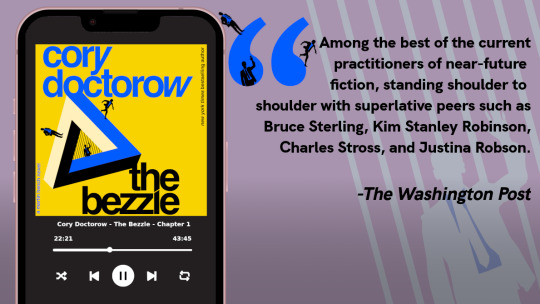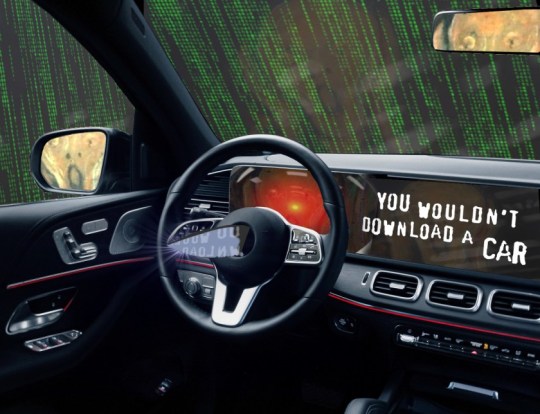#model for business
Text
if i were an extremely wealthy owner of a television network i would shrimply pick up all the successful shows netflix and hbo and disney cancelled that ppl made petitions abt and the creators said they have more written for
and then make more seasons of them and my network's ratings would be wildly high and also it'd be baller pr or w/e
#yes i know purchasing the rights would be difficult but if u could get them it'd be a fucking fantastic investment#listen. LISTEN. business model. make a streaming service. call it 'rescue' or something. ResQ. there.#is this feasible???? i do not know! but it'd be sooooo good
25K notes
·
View notes
Text
How lock-in hurts design

Berliners: Otherland has added a second date (Jan 28) for my book-talk after the first one sold out - book now!

If you've ever read about design, you've probably encountered the idea of "paving the desire path." A "desire path" is an erosion path created by people departing from the official walkway and taking their own route. The story goes that smart campus planners don't fight the desire paths laid down by students; they pave them, formalizing the route that their constituents have voted for with their feet.
Desire paths aren't always great (Wikipedia notes that "desire paths sometimes cut through sensitive habitats and exclusion zones, threatening wildlife and park security"), but in the context of design, a desire path is a way that users communicate with designers, creating a feedback loop between those two groups. The designers make a product, the users use it in ways that surprise the designer, and the designer integrates all that into a new revision of the product.
This method is widely heralded as a means of "co-innovating" between users and companies. Designers who practice the method are lauded for their humility, their willingness to learn from their users. Tech history is strewn with examples of successful paved desire-paths.
Take John Deere. While today the company is notorious for its war on its customers (via its opposition to right to repair), Deere was once a leader in co-innovation, dispatching roving field engineers to visit farms and learn how farmers had modified their tractors. The best of these modifications would then be worked into the next round of tractor designs, in a virtuous cycle:
https://securityledger.com/2019/03/opinion-my-grandfathers-john-deere-would-support-our-right-to-repair/
But this pattern is even more pronounced in the digital world, because it's much easier to update a digital service than it is to update all the tractors in the field, especially if that service is cloud-based, meaning you can modify the back-end everyone is instantly updated. The most celebrated example of this co-creation is Twitter, whose users created a host of its core features.
Retweets, for example, were a user creation. Users who saw something they liked on the service would type "RT" and paste the text and the link into a new tweet composition window. Same for quote-tweets: users copied the URL for a tweet and pasted it in below their own commentary. Twitter designers observed this user innovation and formalized it, turning it into part of Twitter's core feature-set.
Companies are obsessed with discovering digital desire paths. They pay fortunes for analytics software to produce maps of how their users interact with their services, run focus groups, even embed sneaky screen-recording software into their web-pages:
https://www.wired.com/story/the-dark-side-of-replay-sessions-that-record-your-every-move-online/
This relentless surveillance of users is pursued in the name of making things better for them: let us spy on you and we'll figure out where your pain-points and friction are coming from, and remove those. We all win!
But this impulse is a world apart from the humility and respect implied by co-innovation. The constant, nonconsensual observation of users has more to do with controlling users than learning from them.
That is, after all, the ethos of modern technology: the more control a company can exert over its users ,the more value it can transfer from those users to its shareholders. That's the key to enshittification, the ubiquitous platform decay that has degraded virtually all the technology we use, making it worse every day:
https://pluralistic.net/2023/02/19/twiddler/
When you are seeking to control users, the desire paths they create are all too frequently a means to wrestling control back from you. Take advertising: every time a service makes its ads more obnoxious and invasive, it creates an incentive for its users to search for "how do I install an ad-blocker":
https://www.eff.org/deeplinks/2019/07/adblocking-how-about-nah
More than half of all web-users have installed ad-blockers. It's the largest consumer boycott in human history:
https://doc.searls.com/2023/11/11/how-is-the-worlds-biggest-boycott-doing/
But zero app users have installed ad-blockers, because reverse-engineering an app requires that you bypass its encryption, triggering liability under Section 1201 of the Digital Millennium Copyright Act. This law provides for a $500,000 fine and a 5-year prison sentence for "circumvention" of access controls:
https://pluralistic.net/2024/01/12/youre-holding-it-wrong/#if-dishwashers-were-iphones
Beyond that, modifying an app creates liability under copyright, trademark, patent, trade secrets, noncompete, nondisclosure and so on. It's what Jay Freeman calls "felony contempt of business model":
https://locusmag.com/2020/09/cory-doctorow-ip/
This is why services are so horny to drive you to install their app rather using their websites: they are trying to get you to do something that, given your druthers, you would prefer not to do. They want to force you to exit through the gift shop, you want to carve a desire path straight to the parking lot. Apps let them mobilize the law to literally criminalize those desire paths.
An app is just a web-page wrapped in enough IP to make it a felony to block ads in it (or do anything else that wrestles value back from a company). Apps are web-pages where everything not forbidden is mandatory.
Seen in this light, an app is a way to wage war on desire paths, to abandon the cooperative model for co-innovation in favor of the adversarial model of user control and extraction.
Corporate apologists like to claim that the proliferation of apps proves that users like them. Neoliberal economists love the idea that business as usual represents a "revealed preference." This is an intellectually unserious tautology: "you do this, so you must like it":
https://boingboing.net/2024/01/22/hp-ceo-says-customers-are-a-bad-investment-unless-they-can-be-made-to-buy-companys-drm-ink-cartridges.html
Calling an action where no alternatives are permissible a "preference" or a "choice" is a cheap trick – especially when considered against the "preferences" that reveal themselves when a real choice is possible. Take commercial surveillance: when Apple gave Ios users a choice about being spied on – a one-click opt of of app-based surveillance – 96% of users choice no spying:
https://arstechnica.com/gadgets/2021/05/96-of-us-users-opt-out-of-app-tracking-in-ios-14-5-analytics-find/
But then Apple started spying on those very same users that had opted out of spying by Facebook and other Apple competitors:
https://pluralistic.net/2022/11/14/luxury-surveillance/#liar-liar
Neoclassical economists aren't just obsessed with revealed preferences – they also love to bandy about the idea of "moral hazard": economic arrangements that tempt people to be dishonest. This is typically applied to the public ("consumers" in the contemptuous parlance of econospeak). But apps are pure moral hazard – for corporations. The ability to prohibit desire paths – and literally imprison rivals who help your users thwart those prohibitions – is too tempting for companies to resist.
The fact that the majority of web users block ads reveals a strong preference for not being spied on ("users just want relevant ads" is such an obvious lie that doesn't merit any serious discussion):
https://www.iccl.ie/news/82-of-the-irish-public-wants-big-techs-toxic-algorithms-switched-off/
Giant companies attained their scale by learning from their users, not by thwarting them. The person using technology always knows something about what they need to do and how they want to do it that the designers can never anticipate. This is especially true of people who are unlike those designers – people who live on the other side of the world, or the other side of the economic divide, or whose bodies don't work the way that the designers' bodies do:
https://pluralistic.net/2022/10/20/benevolent-dictators/#felony-contempt-of-business-model
Apps – and other technologies that are locked down so their users can be locked in – are the height of technological arrogance. They embody a belief that users are to be told, not heard. If a user wants to do something that the designer didn't anticipate, that's the user's fault:
https://www.wired.com/2010/06/iphone-4-holding-it-wrong/
Corporate enthusiasm for prohibiting you from reconfiguring the tools you use to suit your needs is a declaration of the end of history. "Sure," John Deere execs say, "we once learned from farmers by observing how they modified their tractors. But today's farmers are so much stupider and we are so much smarter that we have nothing to learn from them anymore."
Spying on your users to control them is a poor substitute asking your users their permission to learn from them. Without technological self-determination, preferences can't be revealed. Without the right to seize the means of computation, the desire paths never emerge, leaving designers in the dark about what users really want.
Our policymakers swear loyalty to "innovation" but when corporations ask for the right to decide who can innovate and how, they fall all over themselves to create laws that let companies punish users for the crime of contempt of business-model.

I'm Kickstarting the audiobook for The Bezzle, the sequel to Red Team Blues, narrated by @wilwheaton! You can pre-order the audiobook and ebook, DRM free, as well as the hardcover, signed or unsigned. There's also bundles with Red Team Blues in ebook, audio or paperback.

If you'd like an essay-formatted version of this post to read or share, here's a link to it on pluralistic.net, my surveillance-free, ad-free, tracker-free blog:
https://pluralistic.net/2024/01/24/everything-not-mandatory/#is-prohibited

Image:
Belem (modified)
https://commons.wikimedia.org/wiki/File:Desire_path_%2819811581366%29.jpg
CC BY 2.0
https://creativecommons.org/licenses/by/2.0/deed.en
#pluralistic#desire paths#design#drm#everything not mandatory is prohibited#apps#ip#innovation#user innovation#technological self-determination#john deere#twitter#felony contempt of business model
3K notes
·
View notes
Text
Hope you had a nice weekend 😊

#transfem#trans positivity#trans pride#trans women are beautiful#transgender#trans woman#tr#transgirl#trans#trans gender#trans model#trans owned business#trans women are amazing#trans queen
2K notes
·
View notes
Text
So like...Sam's Liminal. Definitely Liminal.
She's also very pretty.
Constantine's a little tipsy, but he's very, very sure he just accidentally sat next to a Fae at the bar.
Heavily influenced by certain lines in Inferno, buttttt
Sam's a very pretty young woman. Beautiful smile (with too sharp teeth), lovely eyes (but they're a little too wide, a little too bright), fantastic skin (unnaturally pale, suspiciously cold), and a very pretty face (perfectly symmetrical)-first glance anyone who leans towards women would get instant butterflies in the stomach.
But Constantine's been around danger enough to recognize those aren't butterflies.
That's fear.
There's a deep, instinctual fear that is telling him he has to run.
Just as he's about to leave, though, her hand rests itself on his arm.
"Leaving so soon, Hellblazer? And here I thought you'd want to take a look at this...interesting contract I found."
Ah. Shit.
He sits back down, next to the Unseelie Fae who, apparently, owns part of his soul.
Sam, for her part, just wants to scare the idiot straight so he'll stop making work for Danny. (Danny's days are almost nothing but fielding complaints about Constantine and he's so fucking close to hunting the man down himself).
#dpxdc#dcxdp#dp x dc#dc x dp#phanfic#story prompt#new headcanon that the people from Amity are so liminal that they're unnaturally pretty#and it freaks people out#Paulina became a model that doesn't get the short end of the stick#because every single modeling agency is too terrified of her to try to cheat her#val ended up working as vlad's secretary and is set to inherit his business#and the business world is absolutely terrified of both of them#dash is the prettiest cop in gotham#he's also the scariest#the longer you stand next to him the more creeped out you get but you don't understand WHY#unnaturally beautiful amity parkers#and the actual fae are getting really confused#because they'll see an amity parker in the wild#and think it's one of their own for a second#but it isn't#that's something new#something dangerous#and it's staring right at them
1K notes
·
View notes
Text
#tumblr polls#personal#pls rb once you vote!!#i wanna know which one wins so i can better tweak my gifs for that platform :)#mobile users: please drop what phone model you use in the tags#bc how are u able to use tumblr on mobile when the app is laggy as hell#it takes me three business days to reblog one gifset
1K notes
·
View notes
Text
Watching a Netflix show nowadays is like curling up next to a warm fire on a cold winter’s night and reading your new favorite book and just as you get to the good part someone walks past, yanks it out of your hands and throws it into the fire.
#netflix#they really said fuck having endings#we're only about the beginning and sometimes the middle#a good ending shouldn't be kindle for a business model that's on fire#this is exhausting#too many good shows#warrior nun#1899#first kill#teenage bounty hunters#and on and on and on#television
5K notes
·
View notes
Text
This is sad but unfortunately I think this is just going to be the norm for the next few years as streaming services die a slow death.
HBO Max should in theory be able to make money from a show that was at one point the top new series in the US. At the time, David Jenkins said "This is what happens when a major media company invests in inclusive mainstream stories" (agree!) but unfortunately that major media company, like all streaming services, has a terrible business model that can't support that investment.
This is an interesting article about how streaming services are losing money and scrambling to make it back by trying to convince people to buy cheaper, ad-supported options or bundling with other streaming services. Unfortunately for them, I think that's like... all of the options? At some point they're just going to continue to lose money. Making shows is expensive and very few consumers are willing to pay more when they could just cancel and use a cheaper service (or, you know. 🏴☠️)
This is also a good article that was written after Shadow and Bone was cancelled by Netflix about whether it could be saved:
"The problem is that while saving shows used to be plausible, at times, the cost of Shadow and Bone combined with the fact that streaming services are really, really starting to cut back on spending means that this would be an extremely tough sell. WB Discovery’s Max is being lambasted for killing finished projects for tax breaks to chip into its massive debt. Disney Plus has done the same thing and has said they will cut back on things like expensive Marvel shows. Amazon Prime is mired in expensive creator deals going nowhere and throwing insane amounts of money at projects they are realizing are not panning out. Paramount Plus losing $500 million a year. NBC’s Peacock is losing $650 million a quarter."
TLDR; Streaming services have reached such a dire point financially that they have to cancel some of their most popular content (Marvel shows on Disney+???? These have seemingly been very successful; it's wild to read that they're "cutting back") in the desperate hope that a new season of something that's cheaper to make will get more attention.
What I gathered from these articles is that steaming services are dying a slow death and sadly, a lot of good shows are going to go with them.
#as a teacher i'm Very Familiar With Budget Cuts and listen#when they start doing stuff that doesn't even make logical sense you know it's bad#this is the point where they're pointing at chairs in the break room being like 'do we really need that'#streaming was a terrible business model in the first place#subscriber services are pyramid schemes no i will not elaborate#mine#our flag means death#ofmd#rip in peace#where else can i watch con o'neill tho#him saying 'ooh daddy' haunts my nightmares i want to watch all of his content
866 notes
·
View notes
Text

these tags have been bothering me for a few days now. i understand wanting some private time at home with your partner, but can you not see that this is EXACTLY the attitude i'm talking about?
does your third housemate ALSO get an allotted time where you and your partner have to leave, or is it only for you? is this something you coordinate on days when your housemate is already independently making other plans, or are you just expecting to be able to kick them out of the house at will like this is a college dorm room?
this isn't a situation where you are three equal parties building a life, this is you and your partner treating someone else like a third wheel you wish would go away and a money bank to help you pay your bills. if that works for all parties involved then it's no skin off my nose, but can't you see that this is literally not at all the situation that i was describing? i'll make a very personal post about how it hurts when people act like my housemates would be justified in trying to get rid of me and alloromantic people will literally be like "this sounds great—as long as i can get rid of you!" like do y'all hear yourselves. do you actually see the words when aros post or is it just static for you.
this is the way people talk about their children, how they want their children out of the house so they can have some alone time. not the way you should be talking about a fellow adult who literally pays for and whose name is on the deed of the house you all live in. aro people aren't housepets.
#op#god this fucking sucks. can y'all get some self awareness#alloros mind your own fucking business challenge!! learn to read the room!! it was a personal post!!#(this does not apply to anyone who reblogged agreeing w how stupid the nuclear family model is#and sharing their own similar households you are all genuinely sosososo cool)#i like solidarity i just don't like people trivializing and missing the point of everything i say!
460 notes
·
View notes
Text
my hate for the walton family is literally equal to my hate for jeff bezos. "alice walton seen on her yacht" while walmart has a business model built around poverty of its employees like please jump off the yacht at a high enough altitude to kill yourself if i'm being honest
212 notes
·
View notes
Text

#shiny gear#open shirt#leather pants#satin shirt#man in satin#gay#shiny shirt#sexy hunk#gay bald#men in satin#satinshirt#shiny pants#dress shirt#business shirt#bald muscle#male model#male beauty
184 notes
·
View notes
Text
Your car spies on you and rats you out to insurance companies

I'm on tour with my new, nationally bestselling novel The Bezzle! Catch me TOMORROW (Mar 13) in SAN FRANCISCO with ROBIN SLOAN, then Toronto, NYC, Anaheim, and more!

Another characteristically brilliant Kashmir Hill story for The New York Times reveals another characteristically terrible fact about modern life: your car secretly records fine-grained telemetry about your driving and sells it to data-brokers, who sell it to insurers, who use it as a pretext to gouge you on premiums:
https://www.nytimes.com/2024/03/11/technology/carmakers-driver-tracking-insurance.html
Almost every car manufacturer does this: Hyundai, Nissan, Ford, Chrysler, etc etc:
https://www.repairerdrivennews.com/2020/09/09/ford-state-farm-ford-metromile-honda-verisk-among-insurer-oem-telematics-connections/
This is true whether you own or lease the car, and it's separate from the "black box" your insurer might have offered to you in exchange for a discount on your premiums. In other words, even if you say no to the insurer's carrot – a surveillance-based discount – they've got a stick in reserve: buying your nonconsensually harvested data on the open market.
I've always hated that saying, "If you're not paying for the product, you're the product," the reason being that it posits decent treatment as a customer reward program, like the little ramekin warm nuts first class passengers get before takeoff. Companies don't treat you well when you pay them. Companies treat you well when they fear the consequences of treating you badly.
Take Apple. The company offers Ios users a one-tap opt-out from commercial surveillance, and more than 96% of users opted out. Presumably, the other 4% were either confused or on Facebook's payroll. Apple – and its army of cultists – insist that this proves that our world's woes can be traced to cheapskate "consumers" who expected to get something for nothing by using advertising-supported products.
But here's the kicker: right after Apple blocked all its rivals from spying on its customers, it began secretly spying on those customers! Apple has a rival surveillance ad network, and even if you opt out of commercial surveillance on your Iphone, Apple still secretly spies on you and uses the data to target you for ads:
https://pluralistic.net/2022/11/14/luxury-surveillance/#liar-liar
Even if you're paying for the product, you're still the product – provided the company can get away with treating you as the product. Apple can absolutely get away with treating you as the product, because it lacks the historical constraints that prevented Apple – and other companies – from treating you as the product.
As I described in my McLuhan lecture on enshittification, tech firms can be constrained by four forces:
I. Competition
II. Regulation
III. Self-help
IV. Labor
https://pluralistic.net/2024/01/30/go-nuts-meine-kerle/#ich-bin-ein-bratapfel
When companies have real competitors – when a sector is composed of dozens or hundreds of roughly evenly matched firms – they have to worry that a maltreated customer might move to a rival. 40 years of antitrust neglect means that corporations were able to buy their way to dominance with predatory mergers and pricing, producing today's inbred, Habsburg capitalism. Apple and Google are a mobile duopoly, Google is a search monopoly, etc. It's not just tech! Every sector looks like this:
https://www.openmarketsinstitute.org/learn/monopoly-by-the-numbers
Eliminating competition doesn't just deprive customers of alternatives, it also empowers corporations. Liberated from "wasteful competition," companies in concentrated industries can extract massive profits. Think of how both Apple and Google have "competitively" arrived at the same 30% app tax on app sales and transactions, a rate that's more than 1,000% higher than the transaction fees extracted by the (bloated, price-gouging) credit-card sector:
https://pluralistic.net/2023/06/07/curatorial-vig/#app-tax
But cartels' power goes beyond the size of their warchest. The real source of a cartel's power is the ease with which a small number of companies can arrive at – and stick to – a common lobbying position. That's where "regulatory capture" comes in: the mobile duopoly has an easier time of capturing its regulators because two companies have an easy time agreeing on how to spend their app-tax billions:
https://pluralistic.net/2022/06/05/regulatory-capture/
Apple – and Google, and Facebook, and your car company – can violate your privacy because they aren't constrained regulation, just as Uber can violate its drivers' labor rights and Amazon can violate your consumer rights. The tech cartels have captured their regulators and convinced them that the law doesn't apply if it's being broken via an app:
https://pluralistic.net/2023/04/18/cursed-are-the-sausagemakers/#how-the-parties-get-to-yes
In other words, Apple can spy on you because it's allowed to spy on you. America's last consumer privacy law was passed in 1988, and it bans video-store clerks from leaking your VHS rental history. Congress has taken no action on consumer privacy since the Reagan years:
https://www.eff.org/tags/video-privacy-protection-act
But tech has some special enshittification-resistant characteristics. The most important of these is interoperability: the fact that computers are universal digital machines that can run any program. HP can design a printer that rejects third-party ink and charge $10,000/gallon for its own colored water, but someone else can write a program that lets you jailbreak your printer so that it accepts any ink cartridge:
https://www.eff.org/deeplinks/2020/11/ink-stained-wretches-battle-soul-digital-freedom-taking-place-inside-your-printer
Tech companies that contemplated enshittifying their products always had to watch over their shoulders for a rival that might offer a disenshittification tool and use that as a wedge between the company and its customers. If you make your website's ads 20% more obnoxious in anticipation of a 2% increase in gross margins, you have to consider the possibility that 40% of your users will google "how do I block ads?" Because the revenue from a user who blocks ads doesn't stay at 100% of the current levels – it drops to zero, forever (no user ever googles "how do I stop blocking ads?").
The majority of web users are running an ad-blocker:
https://doc.searls.com/2023/11/11/how-is-the-worlds-biggest-boycott-doing/
Web operators made them an offer ("free website in exchange for unlimited surveillance and unfettered intrusions") and they made a counteroffer ("how about 'nah'?"):
https://www.eff.org/deeplinks/2019/07/adblocking-how-about-nah
Here's the thing: reverse-engineering an app – or any other IP-encumbered technology – is a legal minefield. Just decompiling an app exposes you to felony prosecution: a five year sentence and a $500k fine for violating Section 1201 of the DMCA. But it's not just the DMCA – modern products are surrounded with high-tech tripwires that allow companies to invoke IP law to prevent competitors from augmenting, recongifuring or adapting their products. When a business says it has "IP," it means that it has arranged its legal affairs to allow it to invoke the power of the state to control its customers, critics and competitors:
https://locusmag.com/2020/09/cory-doctorow-ip/
An "app" is just a web-page skinned in enough IP to make it a crime to add an ad-blocker to it. This is what Jay Freeman calls "felony contempt of business model" and it's everywhere. When companies don't have to worry about users deploying self-help measures to disenshittify their products, they are freed from the constraint that prevents them indulging the impulse to shift value from their customers to themselves.
Apple owes its existence to interoperability – its ability to clone Microsoft Office's file formats for Pages, Numbers and Keynote, which saved the company in the early 2000s – and ever since, it has devoted its existence to making sure no one ever does to Apple what Apple did to Microsoft:
https://www.eff.org/deeplinks/2019/06/adversarial-interoperability-reviving-elegant-weapon-more-civilized-age-slay
Regulatory capture cuts both ways: it's not just about powerful corporations being free to flout the law, it's also about their ability to enlist the law to punish competitors that might constrain their plans for exploiting their workers, customers, suppliers or other stakeholders.
The final historical constraint on tech companies was their own workers. Tech has very low union-density, but that's in part because individual tech workers enjoyed so much bargaining power due to their scarcity. This is why their bosses pampered them with whimsical campuses filled with gourmet cafeterias, fancy gyms and free massages: it allowed tech companies to convince tech workers to work like government mules by flattering them that they were partners on a mission to bring the world to its digital future:
https://pluralistic.net/2023/09/10/the-proletarianization-of-tech-workers/
For tech bosses, this gambit worked well, but failed badly. On the one hand, they were able to get otherwise powerful workers to consent to being "extremely hardcore" by invoking Fobazi Ettarh's spirit of "vocational awe":
https://www.inthelibrarywiththeleadpipe.org/2018/vocational-awe/
On the other hand, when you motivate your workers by appealing to their sense of mission, the downside is that they feel a sense of mission. That means that when you demand that a tech worker enshittifies something they missed their mother's funeral to deliver, they will experience a profound sense of moral injury and refuse, and that worker's bargaining power means that they can make it stick.
Or at least, it did. In this era of mass tech layoffs, when Google can fire 12,000 workers after a $80b stock buyback that would have paid their wages for the next 27 years, tech workers are learning that the answer to "I won't do this and you can't make me" is "don't let the door hit you in the ass on the way out" (AKA "sharpen your blades boys"):
https://techcrunch.com/2022/09/29/elon-musk-texts-discovery-twitter/
With competition, regulation, self-help and labor cleared away, tech firms – and firms that have wrapped their products around the pluripotently malleable core of digital tech, including automotive makers – are no longer constrained from enshittifying their products.
And that's why your car manufacturer has chosen to spy on you and sell your private information to data-brokers and anyone else who wants it. Not because you didn't pay for the product, so you're the product. It's because they can get away with it.
Cars are enshittified. The dozens of chips that auto makers have shoveled into their car design are only incidentally related to delivering a better product. The primary use for those chips is autoenshittification – access to legal strictures ("IP") that allows them to block modifications and repairs that would interfere with the unfettered abuse of their own customers:
https://pluralistic.net/2023/07/24/rent-to-pwn/#kitt-is-a-demon
The fact that it's a felony to reverse-engineer and modify a car's software opens the floodgates to all kinds of shitty scams. Remember when Bay Staters were voting on a ballot measure to impose right-to-repair obligations on automakers in Massachusetts? The only reason they needed to have the law intervene to make right-to-repair viable is that Big Car has figured out that if it encrypts its diagnostic messages, it can felonize third-party diagnosis of a car, because decrypting the messages violates the DMCA:
https://www.eff.org/deeplinks/2013/11/drm-cars-will-drive-consumers-crazy
Big Car figured out that VIN locking – DRM for engine components and subassemblies – can felonize the production and the installation of third-party spare parts:
https://pluralistic.net/2022/05/08/about-those-kill-switched-ukrainian-tractors/
The fact that you can't legally modify your car means that automakers can go back to their pre-2008 ways, when they transformed themselves into unregulated banks that incidentally manufactured the cars they sold subprime loans for. Subprime auto loans – over $1t worth! – absolutely relies on the fact that borrowers' cars can be remotely controlled by lenders. Miss a payment and your car's stereo turns itself on and blares threatening messages at top volume, which you can't turn off. Break the lease agreement that says you won't drive your car over the county line and it will immobilize itself. Try to change any of this software and you'll commit a felony under Section 1201 of the DMCA:
https://pluralistic.net/2021/04/02/innovation-unlocks-markets/#digital-arm-breakers
Tesla, naturally, has the most advanced anti-features. Long before BMW tried to rent you your seat-heater and Mercedes tried to sell you a monthly subscription to your accelerator pedal, Teslas were demon-haunted nightmare cars. Miss a Tesla payment and the car will immobilize itself and lock you out until the repo man arrives, then it will blare its horn and back itself out of its parking spot. If you "buy" the right to fully charge your car's battery or use the features it came with, you don't own them – they're repossessed when your car changes hands, meaning you get less money on the used market because your car's next owner has to buy these features all over again:
https://pluralistic.net/2023/07/28/edison-not-tesla/#demon-haunted-world
And all this DRM allows your car maker to install spyware that you're not allowed to remove. They really tipped their hand on this when the R2R ballot measure was steaming towards an 80% victory, with wall-to-wall scare ads that revealed that your car collects so much information about you that allowing third parties to access it could lead to your murder (no, really!):
https://pluralistic.net/2020/09/03/rip-david-graeber/#rolling-surveillance-platforms
That's why your car spies on you. Because it can. Because the company that made it lacks constraint, be it market-based, legal, technological or its own workforce's ethics.
One common critique of my enshittification hypothesis is that this is "kind of sensible and normal" because "there’s something off in the consumer mindset that we’ve come to believe that the internet should provide us with amazing products, which bring us joy and happiness and we spend hours of the day on, and should ask nothing back in return":
https://freakonomics.com/podcast/how-to-have-great-conversations/
What this criticism misses is that this isn't the companies bargaining to shift some value from us to them. Enshittification happens when a company can seize all that value, without having to bargain, exploiting law and technology and market power over buyers and sellers to unilaterally alter the way the products and services we rely on work.
A company that doesn't have to fear competitors, regulators, jailbreaking or workers' refusal to enshittify its products doesn't have to bargain, it can take. It's the first lesson they teach you in the Darth Vader MBA: "I am altering the deal. Pray I don't alter it any further":
https://pluralistic.net/2023/10/26/hit-with-a-brick/#graceful-failure
Your car spying on you isn't down to your belief that your carmaker "should provide you with amazing products, which brings your joy and happiness you spend hours of the day on, and should ask nothing back in return." It's not because you didn't pay for the product, so now you're the product. It's because they can get away with it.
The consequences of this spying go much further than mere insurance premium hikes, too. Car telemetry sits at the top of the funnel that the unbelievably sleazy data broker industry uses to collect and sell our data. These are the same companies that sell the fact that you visited an abortion clinic to marketers, bounty hunters, advertisers, or vengeful family members pretending to be one of those:
https://pluralistic.net/2022/05/07/safegraph-spies-and-lies/#theres-no-i-in-uterus
Decades of pro-monopoly policy led to widespread regulatory capture. Corporate cartels use the monopoly profits they extract from us to pay for regulatory inaction, allowing them to extract more profits.
But when it comes to privacy, that period of unchecked corporate power might be coming to an end. The lack of privacy regulation is at the root of so many problems that a pro-privacy movement has an unstoppable constituency working in its favor.
At EFF, we call this "privacy first." Whether you're worried about grifters targeting vulnerable people with conspiracy theories, or teens being targeted with media that harms their mental health, or Americans being spied on by foreign governments, or cops using commercial surveillance data to round up protesters, or your car selling your data to insurance companies, passing that long-overdue privacy legislation would turn off the taps for the data powering all these harms:
https://www.eff.org/wp/privacy-first-better-way-address-online-harms
Traditional economics fails because it thinks about markets without thinking about power. Monopolies lead to more than market power: they produce regulatory capture, power over workers, and state capture, which felonizes competition through IP law. The story that our problems stem from the fact that we just don't spend enough money, or buy the wrong products, only makes sense if you willfully ignore the power that corporations exert over our lives. It's nice to think that you can shop your way out of a monopoly, because that's a lot easier than voting your way out of a monopoly, but no matter how many times you vote with your wallet, the cartels that control the market will always win:
https://pluralistic.net/2024/03/05/the-map-is-not-the-territory/#apor-locksmith

Name your price for 18 of my DRM-free ebooks and support the Electronic Frontier Foundation with the Humble Cory Doctorow Bundle.

If you'd like an essay-formatted version of this post to read or share, here's a link to it on pluralistic.net, my surveillance-free, ad-free, tracker-free blog:
https://pluralistic.net/2024/03/12/market-failure/#car-wars

Image:
Cryteria (modified)
https://commons.wikimedia.org/wiki/File:HAL9000.svg
CC BY 3.0
https://creativecommons.org/licenses/by/3.0/deed.en
#pluralistic#if you're not paying for the product you're the product#if you're paying for the product you're the product#cars#automotive#enshittification#technofeudalism#autoenshittification#antifeatures#felony contempt of business model#twiddling#right to repair#privacywashing#apple#lexisnexis#insuretech#surveillance#commercial surveillance#privacy first#data brokers#subprime#kash hill#kashmir hill
2K notes
·
View notes
Note
disney has a vault? huh?
it was an absolutely insane forced scarcity marketing tactic disney did where they sold VHS videos of their films for a limited time before stopping production of them to sell again at a later date. it sucked in every way imaginable
300 notes
·
View notes
Text

20 years is a long fuckin time
#not that Tommy was young but gman model looks great for . checks notes . 57#the trailer made me miss him#nobody look too closely at this btw I have not slept I’ve been BUSY (breaking bad)#this was also mostly 2 fuck w colours#hl2vrai#tommy coolatta
311 notes
·
View notes
Text





i wish we could do this instead of killing him 😇
-
+bonus shot that looks nice but didn't fit so well when put in sequence with the others

#raphael bg3#raphael#bg3#baldur's gate 3#cw blood#obviously if we could spare him after the fight he would NOT let that slide and he'd probably try to kill us again but yknow. it's fine#the 😇 in the caption was a misclick but i think it's funny so it stays#anyway mods r a slippery slope they give me SO much power... the power to put him in Situations#but man i gotta say taking pics with his cambion model is a time and a half because it's kind of fucked LMAO#the wings clip like nobody's business and they aren't stuck to his back properly so there's gaps#the hair mesh must have some issues bc there's spots around his ears that i have to strategically hide or blur or edit#plus his skin is so bright/vibrant that it requires some finagling to make sure it doesn't look overly garish or washed out#worth it tho he's so pretty in this form#charm point: his teef :)#my screenshots#mine
303 notes
·
View notes
Text

S/S ‘17 Guo Pei
#fashion#high fashion#luxurious#luxury#fashion model#fashion week#fashion blog#fashion and lifestyle#fashion and costumes#fashion apparel#fashion and beauty#fashion basics#fashion backstage#fashion business#fashion catalogue#fashion collaboration#fashion design#couture#luxury dress#luxury fashion#luxury design#spring summer#ss17#runway walk#runway model#runway fashion#runway#catwalk#model fashion#beautiful model
488 notes
·
View notes
Text



Selfishly thinking that Orion could be persuaded to act in one of the band music video. Just once.
Anyway, go play @infamous-if cause it’s amazing!
Little bonus, I put the rambly scenario that sprouted these under the cut in case you wanna know more 🤷♀️
It’s got to be a team effort and a chore to get Orion on board but somehow they manage to convince him in the end(cause he got a soft spot). In my head the idea was Violet and Rowan’s, Iris jumped right in cause it sounded fun and then Jazzy and Devyn joined in. Chris tagged along too cause heck yeah. They all come up with a list of pros and cons cause they know that Orion will fight against it, but thanks to Devyn they come up with sound and logical enough reasons. Rowan and Violet do the presentation and after a lot of debate, Orion accept in the end to everyone (and his own) disbelief. The video is a success, the views count gets higher and half the comment are about Orion.The band tease him relentlessly and Orion swears never again. The end.
#infamous if#infamous#infamous violet#infamous oc#violet rose#i blame the very cool photoshoot I found on Pinterest that inspired me to do these#they are on a bridge or a rooftop you decide cause I couldn’t#listen I love all the seven drama but Orion is the reason why I started to play the game#read his description and I was like yep thanks I’m sold I’ll have him#also I know Orion would never but a girl can dream#plus the views would skyrocket so it’s good business#just unprofessional but yk#also the song is leave before you love me but zayn Malik cover cause I like the vibe better#I was debating with so many songs for these#in the end it was either belladonna by Ava max she or borderz by zayn#then I found this cover and I was like this fits violet and Orion better in my head so here we are#I’m a pop junky what can I saw#I’m sorry i only have infamous in my head rn#on a side note for the little scenario imagine Orion’s colleague from Carolina records seeing the video and sputtering coffee all over#cause yes he looks like a model from a perfume ad#okay I’m done rambling go play the game#my art#illustration
330 notes
·
View notes